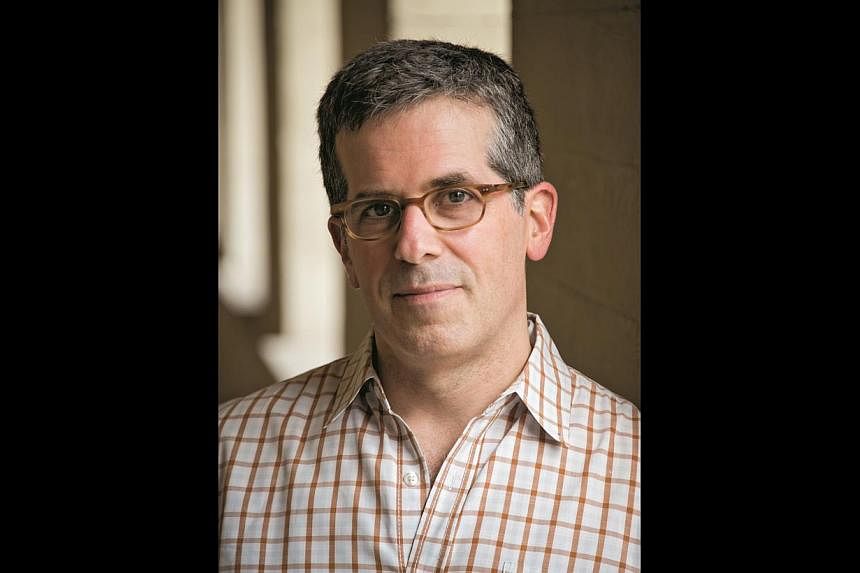Jonathan Lethem's love of sci-fi icon Philip K Dick is legendary.
The 50-year-old American novelist has a tattoo of a first-edition cover of Dick's novel, Ubik, on his left bicep, featuring a spray can of the mysterious titular substance.
He confirms that he has read everything in his idol's oeuvre. He has written worshipful, incandescent essays about the man. He co-edited the sprawling, magnificent Exegesis Of Philip K Dick (2011), a 976-page tapestry woven from thousands of pages of notes, letters, journal entries and story sketches, in which Dick attempted to excavate his religious and visionary experiences.
But Lethem (whose name sounds like 'lethal') does, in fact, have a least favourite Dick story. Over the telephone from his home in Claremont, California, he cannot resist a chuckle as he reveals: "Oh, there are so many bad ones - it's great! There is abundant choice because he wrote plenty of mediocre things.
"In the novels, there are two or three from the 1950s that are pretty much value-less. There's one called Vulcan's Hammer. And Dr Futurity - I have no use for Dr Futurity. It's something I would never re-read."
Dr Futurity, in a nutshell, revolves around a time-travelling doctor.
Lethem has achieved something of a cult status for his rich, teeming novels - nine of them - stuffed with an eclectic blend of detective noir, science fiction, gritty realism, twists of magic and a stream of hip pop culture references.
He is one of the headliners at next month's Singapore Writers Festival, where he will take part in two panel discussions and give a lecture titled Words Are Not Paint: Or, How I Learned to Stop Worrying And Love Cultural References.
It will be his first trip to South-east Asia. Festivals, he feels, are preferable to book tours. With a weary edge in his voice, he says: "Book tours have this grinding commercial element, where you're just trying to talk about the same books, make the book-sellers like you."
Then he perks up: "Festivals are nicer because there's collegiality, there's meeting other writers. I'm very curious, for instance, about Paul Theroux. I grew up reading him. And so to not only be thrown into a situation where I'll meet him but be together in this unusual environment - it's a lucky way to live."
He spoke to Life! just after dinner with his family and was about to tuck his two young sons, aged four and seven, into bed. Their bedtime reading material? The award-winning comic book series Bone by Jeff Smith.
It seems that every nook of Lethem's life bears touches of his inclination to knit together what is conventionally "high- brow" and "low-brow" in the literary world.
Born to an artist father and activist mother, he was raised in an environment primed for art-making.
His brother is an artist; his sister, a photographer. They grew up in pre- gentrified Brooklyn, New York - which has translated to a fascination with the place in a couple of his novels - and led a decidedly bohemian childhood in a commune, where nudity was frequent and accepted as part of daily life.
There are traces of Lethem's personal history scattered throughout his novels, breadcrumbs that his readers quickly pick up on - the white, Jewish protagonist of the coming-of-age novel The Fortress Of Solitude (2003) seems to go through many similar childhood experiences; Dissident Gardens (2013), a three- generation epic about America's radicals, germinated because Lethem was curious about his grandmother's sex life. His mother died of a brain tumour when he was 14 - that tragedy also haunts his pages.
He says he has come to accept this "surrendering" of his personal life as "part of the bargain". He adds: "I was a reader before I was a writer and I had the same hunger to understand the people who had written the books that mattered to me, and the sense that I did have some sort of claim over their lives, that I could learn an immense amount and feel disappointed in them or have these kinds of imaginary friendships with them.
"So I knew it from that side before I was in this position myself and I think it's something that, as a writer, at some point, I just had to accept."
Of course, his family knows "precisely how much nonsense" his books contain "because they're the ones who know the real story". He is also grateful for their staunch support. "My father makes paintings which draw on his imagination but also on his life and he understands this process, and he created a family where we all understand and participate in similar gestures of taking things from life and making them into art," he says.
Lethem, who initially wanted to be a painter like his father, enrolled in Vermont's Bennington College in 1982. But he realised that he really wanted to write instead and promptly dropped out. He gained his literary education by working in antiquarian bookstores and gaining an encyclopaedic knowledge of the dustiest corners of literature, and also seeking out mentors such as the speculative fiction writer Carter Scholz.
Lethem is now the Roy E. Disney Chair of Pomona College's creative writing programme, a position formerly held by the late David Foster Wallace.
He is currently working on a "more international and contemporary" novel. His main character, "a backgammon player who runs out of luck", starts out in Berlin, which is also where Lethem started working on the book after receiving the American Academy's Berlin Prize.
"I don't know a lot more than that yet," he says with a laugh. He feels that his novels tend to unfold around a character, who then dictates the plot around him or her.
He also tries to write every day, no matter how briefly, even if it is just to give his literary muscles a workout. "If I do that, the other things seem to take care of themselves. My mind remains connected to the book that I'm working on, the pages pile up and all is right with the world, I'm friendly and a good human being. If I don't do it every day, things start to get off the rails. So I no longer invite disaster, I just get up and write."
And while his books span the completely imaginary (mobster kangaroos in Gun, With Occasional Music, 1994) to the uncannily accurate (a detective with Tourette syndrome, one marked by involuntary verbal and physical tics, in Motherless Brooklyn, 1999), he has come to find that a common thread that runs through his books are "the things that people disguise from themselves".
He adds: "I'm always interested in these matters of how we edit our consciousness, of memory and forgetting and denial, and the blinders we wear and the protections we create, the way consciousness shapes what we believe, what we call reality. We are fiction-making machines."
He has received several awards for his work, the largest of which was the US$625,000 MacArthur Fellowship (2005), more commonly known as the "Genius Grant", which gives the money to its recipients with no strings attached.
And yet, he still has moments of doubt. He mulls: "It's a constant companion. I think it's just built in to this practice. But also when you've done this for so long, I guess you might almost say that the doubt or the moments of disappointment or insufficiency - these are companions that become almost like house pets.
"You might have an old mangy cat - you look at it in the corner of the room and it's not the best thing there. But you're not afraid of it any more. It's just something you take care of. It's like that."
Follow Corrie Tan on Twitter @CorrieTan
For more information about the Singapore Writers Festival, go to www.singaporewritersfestival.com



